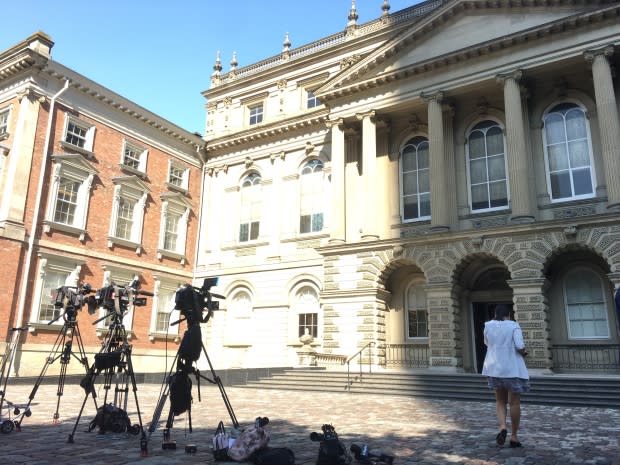Bill to cut Toronto council won't be put to vote if stay granted, province's lawyer says
A three-judge panel of the Ontario Court of Appeal will release its decision Wednesday at 10 a.m. on whether it will grant a stay of a lower court's ruling striking down the Ontario government's initial legislation slashing the size of Toronto city council weeks before a civic election.
The decision is expected at 10 a.m.
Last week, Ontario Superior Court Justice Edward Belobaba deemed Bill 5, the Better Local Government Act, which would result in Torontonians electing 25 instead of 47 councillors this October, to be "unconstitutional" and "antithetical to the core principles of our democracy."
After that, Premier Doug Ford's government made a second attempt at introducing legislation to slash Toronto council in the form of Bill 31, the Efficient Local Government Act, using a constitutional provision known as the notwithstanding clause.
But meanwhile, the PCs are also seeking a stay of Belobaba's ruling, which reinstated the city's 47 wards. If the province is successful on Wednesday, city staff will immediately start planning for an election based on the 25-ward model.
Lawyers for the province, as well as for council candidates and the city, were in court Tuesday making arguments for and against a stay.
Robin Basu, lawyer for the Ontario government, surprised the courtroom by saying Bill 31 would not be brought forward for a vote if a stay is granted.
Stay would eliminate uncertainty, province argues
A stay would give the city clerk certainty over the election timeline, Basu said. The clerk could use the dates outlined in the original Bill 5, and would assuage her concerns about advance polling, he said.
Bill 31 puts into question whether advanced polling would occur. Rather than imposing it, Bill 31 leaves that decision at the discretion of Toronto's city clerk.

"There is only one path available to assure the [Toronto city] clerk that she is in a position to proceed with an election with integrity and fairness on Oct. 22," Basu told the court. "It is simply not feasible to prepare for two elections at the same time."
Bill 31 won't be up for a final vote until Thursday at the earliest, and city staff have said the chances of running a fair election on Oct. 22 shrink with every day of uncertainty that goes by.
Province created chaos, opposing lawyers say
But lawyers representing those opposing the stay said the province is responsible for the chaos surrounding the election and thus cannot seek legal relief for the problems it's caused.
If the province wants to restore stability, it can simply stop fighting Belobaba's ruling and allow the election to proceed with 47 wards, said lawyer Howard Goldblatt, who represents a group that includes candidate Chris Moise.
If no stay is granted, city lawyer Diana Dimmer called the province's promise to push forward the new bill — which includes the notwithstanding clause — akin to a "threat."
Bill 31 and its use of the notwithstanding clause has sparked fury and condemnation from opposition parties, legal professionals and the public, and spawned several protests.
It's not the judges' job to "save them from themselves, to take the political heat off," said lawyer Donald Eady, who represents a group that includes candidates.

Goldblatt said it is "ironic' that the crown now says it wants to assist the city clerk.
The city's clerk has said she could carry out an election with 47 wards, and the preparation process for that is "much further along" than for a 25-ward election, said Dimmer.
Goldblatt also noted that a stay could be appealed, and questioned the "certainty" that Basu talked about.
Lawyers also argued that the province put forward no evidence to support its claims that allowing Belobosa's judgment to stand would cause irreparable harm.
"We don't bear the onus" to defeat the stay, said Eady.
He also said granting the stay "exacerbates and continues" the charter rights violations denounced in the lower court's ruling.
Basu countered that the "confusion and uncertainty" also comes from the court challenges from the city and others.
He said the province moved as quickly as possible because it wanted to intervene as early as possible, before the election really got underway. The campaign officially began in May.
In his argument, Basu also said that 16 people have signed up for a 25-ward election — after the initial nomination period had closed — which means there's a consequence for those candidates with a shift back to a 47-ward model.
The province's lawyers said that if granted the stay, the government's appeal of the lower court ruling could be heard on an expedited timeline after the election and resolved before a new Toronto council is sworn in on Dec. 1.
After a question from the panel, city lawyer Dimmer said if a stay is granted, the nomination period will be open again for two days so those who did not register can do so.

